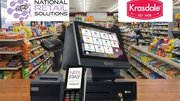Article
Coinstar's Kaplan on redbox, risk, new products, kiosks and self-service
The leader of the firm that launched redbox and the green counting machine discusses the firm's successes and plans for continued growth.

August 15, 2010
Gregg Kaplan, president and COO of Coinstar Inc. spoke by phone with editor Burney Simpson last week after the Bellevue, Wash.-based kiosk operator announced deals with CVS/Pharmacy and ecoATM.There are about 19,000 installed Coinstar coin-counting machines installed worldwide; its redbox device has helped change the DVD rental business. This is an edited version of Kaplan's remarks.
Q: You have a stated goal of 30,000 installed redbox kiosks. Where do you stand today?
Kaplan: We have about 23,000 locations for the redbox and DVD Express kiosks. There are about 26,900 kiosks installed. Some locations have multiple installed kiosks.
Q: You announced in July you would offer Blu-ray DVDs for a premium charge of $1.50 a night versus $1 for a typical DVD. What has been the response? And are there other products where you might charge a premium?
Kaplan: We don't have numbers yet. We're optimistic; there's lots of demand. We believe (Blu-ray) will be a good product for us.
We are testing video games, but don't have plans for a rollout yet. Video games are a different kind of product (from movies) and most likely they will have a different price point. We don't know that price point yet.
Q: Many believe that consumers will shift to renting and viewing movies and other entertainment through digital streaming from their cable company or another provider. How are you preparing for this?
Kaplan: We've talked about this. We believe over time the world is going digital. We understand it will grow and have impact. But now digital streaming represents a tiny fraction of (rentals) of physical DVDs. It could take longer than many people believe.
We've considered ways we could work in this space. We've worked internally to prepare for digital. In our third quarter (analysts') conference call we may discuss our work here.
The technology we're evaluating today is not really streaming through a redbox machine. But you could download (a DVD at a redbox) to a zip drive or something like that. We've not found (a technology) we like at this time.
We see digital streaming as part of the Coinstar product mix. Digital movies is somewhere we could effectively play.
Q: There has been speculation on other products that could be sold through a Coinstar device, including cosmetics and something electronics-related following your investment in ecoATM, a firm that operates kiosks where consumers can trade in cell phones.
Kaplan: There are three ideas we've spoken about and are exploring in expanding our product line. First is cosmetics, second is coffee, and the third is the ecoATM concept.
I can't talk about this in further detail because all are at an early stage. New products are inherently risky. We are comfortable with risk and understand there may be failures. My background is in new products. We plant lots of seeds. We don't want to set high expectations. Things need room to grow.
Consider the ecoATM. It's a concept we are interested in. The consumer brings in a used cell phone, plugs it into the kiosk, and it validates the product and offers a price for it that could be loaded on a gift card. The consumer accepts the amount and the kiosk gives him a card.
EcoATM checks most of the boxes that fits our corporate outlook. It's a huge and growing market. It fits an unmet need that is the typical consumer has a bunch of old cell phones sitting in a drawer. It fits our corporate goal of social responsibility, with recycling and reuse of the product. We like the ecoATM (management) team. The technology is proprietary, that is defensible, this database of phone information. You could possibly take it to other consumer electronic products. It fits a good criteria, it checks all these boxes.
Q: Why do you think the public has responded so strongly to self-service kiosks?
Kaplan: I got into this about eight years ago at McDonalds where we coined the phrase ‘auto-retail.' This was broader than just vending machines — which at the time primarily meant candy and soft drinks — and were located in colleges, corporations, factories. Generally the cost was less than $1, and (the operator had) no connectivity to the machine.
But there was a great trend to self-service. Consumers were accepting it, and eventually they preferred it for many everyday tasks. A few years ago, if you asked a roomful of people ‘When was the last time you went to a bank teller?' They'd say they couldn't remember. Today, you get the same answer when you ask, ‘When was the last time you used check in at the airport?' or, ‘When did you last see a video store clerk?'
People are more comfortable with (self-service). In fact they prefer it. Also, the price of technology to provide this service keeps going down.These opportunities offer real opportunity for auto-retail.
Fast forward and you have Coinstar and redbox machines deployed quickly by local operators who maintain the devices. Customers expect uptime and functionality. That employee must care about the device as if it's their own.
The devices are deployed at retailers like Walmart, Walgreens, McDonald's, excellent locations.
Now there is an opportunity for new products like cosmetics, coffee and the ecoATM. All those fit (our approach).
Q: Thanks, Gregg.
 ChatGPT
ChatGPT Grok
Grok Perplexity
Perplexity Claude
Claude










